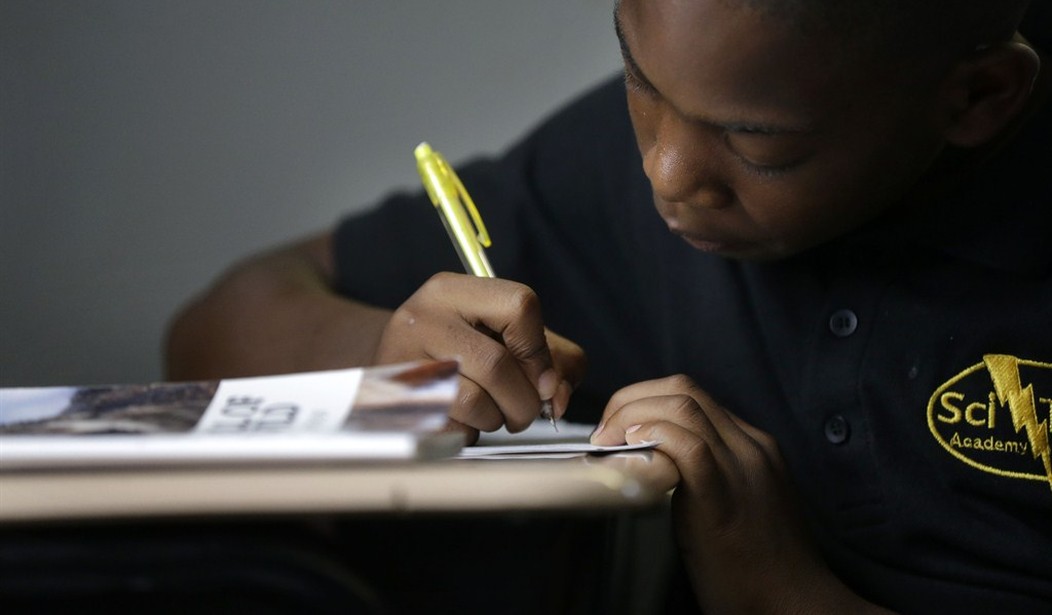The Washington Post’s Valerie Strauss has inadvertently done the country an invaluable service by allowing the rest of us to travel through the looking-glass into a universe where things are the opposite of real life: the world of far-left thought on education.
Strauss gave premium blogspace to a bitter article by a former education fellow for The Progressive magazine, Sarah Lahm. The piece, titled “What Passes for School Choice Rhetoric is Frightening,” is rife with errors and half-truths. It is hard to imagine a more factually bankrupt anti-school choice “argument” could be written, and by shining a gigantic spotlight on it, Strauss has unwittingly harmed her cause.
Lahm penned her bitter attack after attending a National School Choice Week event (one of more than 16,000 scheduled nationwide) hosted by the University of Minnesota’s Hubert H. Humphrey School of Public Affairs. The forum attendees and the panelists—a former Democratic state senator, a Republican state legislator, and Richard Komer, who is associated with the so-called “right-wing” Institute for Justice—drew Lahm’s ire immediately for being “all white … as far as [she] could see.”
The racial profile of the panel, of course, has nothing to do with the important ideas the panel members espoused about improving education, but even if it does matter to some, why would a supposedly all-white panel be shocking in Minnesota, a state whose population is roughly 85 percent white? (Pay no attention to the fact Lahm is also white.) Further, it should be noted George Parker, an African-American who is affiliated with the public school reform group StudentsFirst, was originally supposed to be a panel member, but he was unable to attend.
Recommended
Not only were the attendees mostly white, they were also “formally dressed,” Lahm frets. Frightening, I know. Whenever formally dressed white people gather together, you know there is nefarious plotting afoot.
In addition to the attendees’ skin color, what particularly irked Lahm was the forum being held at the Humphrey School. That an event arguing for, in Lahm’s fevered imaginings, the “resegregation” and “deregulation” of the public school system should take place at an institution named after Hubert Humphrey—the former Democratic Minnesota senator, vice president, self-proclaimed “Happy Warrior,” and civil rights champion—she found especially appalling.
Lamenting Humphrey’s legacy being eclipsed by that of President Ronald Reagan, Lahm wonders “what our education policy discussions [would] be like today … if America had turned out ‘less Reaganite’ and ‘more Humphreyish?’”
“Reaganite” policies, according to Lahm, have “[propelled] America away from further investments in public schools” since the publication of the “hyped” A Nation at Risk report in 1983. Lahm says this has led to the creation of an educational environment where events that include panels who make “racist, elitist assumptions about what ‘poor minorities’ want” are held in schools named after civil rights champions. (How is a white liberal any more qualified to talk about the wants and needs of minorities than a white conservative?)
Lahm spent so much space in her blog post spewing vile contortions of the situation that she left herself no room to present a fact-based argument against school choice—proof positive she had no case to make in the first place.
Lahm’s charge school choice is leading to the “rapid resegregation” of public schools is categorically false. The Friedman Foundation for Educational Choice has an entire page on its website highlighting “gold-standard” research showing school choice is actually better at promoting racial integration and tolerance of social differences than ZIP-code-assigned public schools are. The federal government’s own data do not even back up her assertion. If school choice advocates truly are nothing more than racists in disguise, it’s puzzling so many people from so many different demographics are clamoring for choice.
Why would Martin Luther King III, for instance, attend rallies for school voucher programs and give statements such as, “What [school] choice does is essentially to create options, particularly for poor and working families[,] that they would not necessarily normally have,” and why would black voters be so overwhelmingly supportive of choice programs? Are they racists too?
The allegation A Nation at Risk caused the United States to shy away from “further investments in public schools” is another claim not based in reality. The report, a product of the nonpartisan National Commission on Excellence in Education, sounded an alarm about the dismal state of public education in the United States and led to a doubling in inflation-adjusted per-pupil spending over the following 30 years and an increased role in education by the federal government. The United States now spends 35 percent more per-pupil than theOrganisation for Economic Co-Operation and Development (OECD) average.
Finally, Lahm is completely mistaken in claiming school choice is in opposition to everything Humphrey stood for. As my colleague Robert Holland writes, “Humphrey was among a group of Democratic senators … who strongly supported tax credits for families paying private tuition at private or parochial schools [and] … in 1968 [Humphrey ran for president] on a platform calling for tuition tax credits as a tool to help equalize educational opportunities for underprivileged kids.”
The unfortunate truth for the defenders of the abysmal status quo in public education is school choice offers families equal access to higher-quality schools that meet their widely diverse needs and desires. That’s the truth, regardless of whether proponents of anti-choice, bureaucratic-centric policies, such as Lahm and Strauss, choose to acknowledge it.

























Join the conversation as a VIP Member